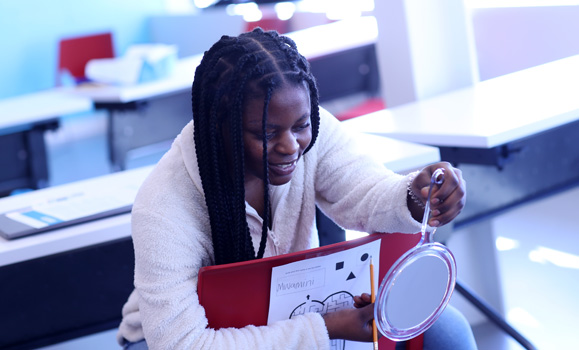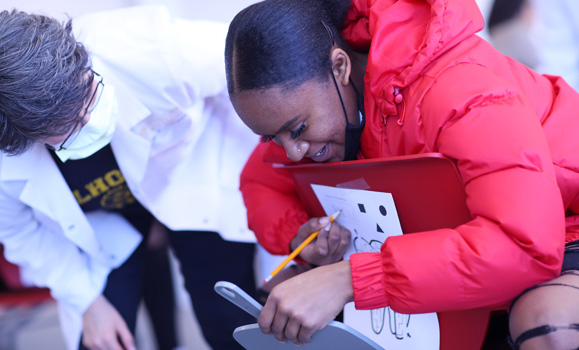The COVID-19 pandemic presented some challenges for Promoting Leadership in health for African Nova Scotians (PLANS) to offer its regular camps for teens. But an unexpected grant through the Dartmouth General Hospital Foundation and the RBC Foundation provided the perfect opportunity to connect with African Nova Scotian high school students who are interested in careers in the health professions.
For Sarah Upshaw, the program manager of , it was a great opportunity, although it meant creating a 14-week program at short notice. She worked with the Faculties of Medicine, Dentistry, and Health to hold sessions on many different health professions, together with information about applying to university, scholarships, and financial literacy.
ÔÇťI wanted to provide a meaningful experience for the students and make the best use of the funds I had for the program,ÔÇŁ says Upshaw.
Students in the co-op program at five local high schools provided the ideal audience for the new PLANS program. They were already enrolled in a co-op program, 80 hours of which was allocated to a placement. But because of COVID-19, traditional placements for co-op students interested in the health professions ÔÇö such as in hospitals and nursing homes ÔÇö were not available. The PLANS program helped to fill this gap.
What oral health professionals do
At the end of January, 10 Grade 11 and 12 students filed into a conference room at the Zatzman Sportsplex to listen as Cynthia Andrews, Heather Doucette, faculty members in the Faculty of Dentistry and School of Dental Hygiene, respectively, and Juliette Thomas, a dental assistant and the co-ordinator of the North Preston Dental Clinic, explained the roles of dentists, dental hygienists, and dental assistants. Second-year dental hygiene student Jennifer Johnson was also there to answer questions from a student perspective.
Dr. Andrews and Prof. Doucette talked about the educational requirements of their respective programs. They also gave a mini lesson on nutrition and what causes plaque and the problems it can cause. Juliette Thomas set out the responsibilities of her role at the North Preston Dental Clinic as both a dental assistant and the administrator of the clinic.
Prof. Doucette explained why it is important for more African Nova Scotian students to enter the oral health-care professions. ÔÇťWe need more African Nova Scotians in the various health professions. ItÔÇÖs important to increase diversity in health care. Patients feel more comfortable with health-care providers who they can relate to and who may better understand particular barriers to care that they face.ÔÇŁ
Jennifer Johnson fielded questions from students who asked about the workload and the types of activities she was involved in. ÔÇťYou have an eight-to-five day, plus studying in the evenings,ÔÇŁ Jennifer told those gathered. ÔÇťThen in second year you spend 12 hours a week caring for patients. ItÔÇÖs a lot of work, but a lot of fun. And the best part is, you know youÔÇÖll have a job when youÔÇÖre finished.ÔÇŁ
COVID-19 limited the oral health hands-on activities the students were able to try, but they were able to test their reverse hand skills using a mirror ÔÇö something dentists and dental hygienists are required to learn in order to be able to operate on areas of the mouth that cannot be seen directly.
What the students thought
Beth Ejigu, a Grade 11 student at Citadel High School, would like to be a dentist. When asked why, she says itÔÇÖs partly because ÔÇťI enjoy working with my handsÔÇŁ and partly because she has braces on her teeth and is intrigued by oral health care. She says she enjoyed the session and learned a lot.
 Mwamini Bifakubaho (shown left) is a Grade 12 student, also at Citadel. SheÔÇÖs interested in a career in nursing or dentistry, but says she has no one at home she can ask about post-secondary education. The co-op program enables her to explore many different health-care careers and learn about university life and scholarship and bursary options as well.
Mwamini Bifakubaho (shown left) is a Grade 12 student, also at Citadel. SheÔÇÖs interested in a career in nursing or dentistry, but says she has no one at home she can ask about post-secondary education. The co-op program enables her to explore many different health-care careers and learn about university life and scholarship and bursary options as well.
ÔÇťIÔÇÖve never laughed so much in a session before,ÔÇŁ says Tek Omod, a senior student at Citadel, ÔÇťIt was so cool.ÔÇŁ She had been thinking about applying to nursing but is now considering oral health studies too.
Janelle Colley, a Grade 11 student at Auburn High School (pictured below), knows she wants to do something in the medical field and appreciates the broad exposure the PLANS program is giving her. ÔÇťThere are so many programs I didnÔÇÖt know about. ItÔÇÖs really opened my eyes.ÔÇŁ

The oral health session helped Janelle to understand the different roles of dental assistants, dental hygienists, and dentists, and she appreciated that Johnson was on hand to give a student point of view. When asked if she would consider a career in oral health, she says ÔÇťitÔÇÖs definitely something to think about.ÔÇŁ
Next steps for PLANS
Upshaw is delighted with the way the sessions have worked with the co-op students. ÔÇťWe have been able to provide them with information about scholarships, such as the Johnson Pathway Scholarships, and support them through the university application process and any barriers they encounter along the way.ÔÇŁ
She says the students also benefit from attending the sessions as a cohort. ÔÇťThey make friends here and some of them will likely attend college or university together.ÔÇŁ
Sarah already has funding for a second co-op placement program this term and is hopeful that she will be able to roll the program out to rural schools. She is also exploring ways of getting information to junior high students so that they know what courses to take in high school to make them eligible for health-care programs at university.

